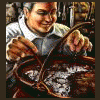Pathfinder - Dubbi del neofita
Risposte in primo piano
- Prec
- 18
- 19
- 20
- 21
- 22
- 23
- 24
- 25
- 26
- 27
- 28
- Successivo
-
- Prec
- 18
- 19
- 20
- 21
- 22
- 23
- 24
- 25
- 26
- 27
- 28
- Successivo
-

This topic is now closed to further replies.
Follower




